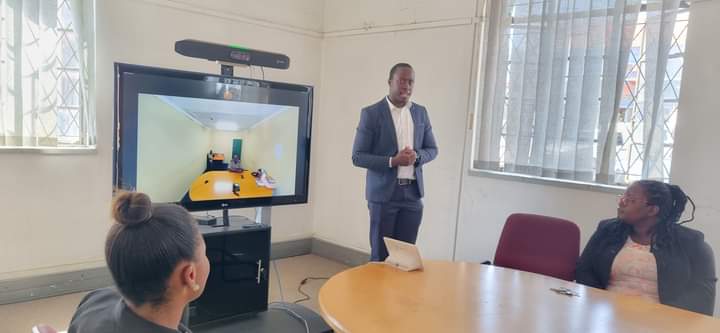By Delisa Thwala
UNDP Eswatini Accelerator Lab (AccLab) initiated an exploration and experimentation with the concept of virtual remand.
The potential benefits of the virtual remand system, such as improved efficiency and reduced costs, were a key focus of these discussions.
This innovative approach aims to revolutionise court processes, enhance efficiency, and ensure timely proceedings.
The AccLab, in line with this, embarked on an experimental approach that commenced with extensive consultations with stakeholders in the judiciary ecosystem of Eswatini.
RELATED: Eswatini’s Greatest Asset: Empowering Youth for a Brighter Future
The UNDP Eswatini 2021–2025 Country Programme Document (CPD) underscores the importance of innovative digital solutions in enhancing government efficiencies.
According to UNDP, their challenge lies in the non-digitisation of judicial systems, which have manual processes that rely on traditional case management methods, including suspects appearing physically in court for remand.
The transportation of individuals held for remand appearances can be cumbersome and expensive as they involve using resources such as vehicles, security officers, and meals for sessions lasting only five to 15 minutes weekly.

“ The Covid-19 pandemic, where court closures during lockdowns led to delays in trials and remand proceedings, exposed the inadequacy of the manual processes,” read the report article from UNDP.
Worth mentioning is that in the early 2000s, the government began exploring the implementation of an electronic case management system aimed at digitising various judicial processes.
In 2011, the government installed equipment and infrastructure to pilot a closed-circuit system for virtual court proceedings, connecting the Mbabane Magistrates Court, Sidwashini Correctional Centre, and the High Court.
Microwave internet technology was introduced to ensure an uninterrupted network during proceedings. However, the system could not be fully implemented at the time due to the lack of a legal framework.
“The passage of the Court Remote Participation Act in 2018 marked significant progress, as it enabled audio-visual links (AVL) in court proceedings.
This legislation came at a crucial time, coinciding with the outbreak of COVID-19 in 2019, which accelerated technological advancements to support online meetings,” further reads the article.
In addition, AccLab seized this opportunity to assist the government in exploring implementing a virtual remote remand system, a vital component of the broader electronic case management system.
RELATED: UNDP Eswatini welcomes new leader to drive development agenda
The insights gained from this experiment have provided valuable guidance for the rollout of the extensive government electronic case management system.
This pilot highlights the importance of UNDP’s catalytic funding in driving innovation through co-creation, leveraging our technical and advisory expertise to help governments and partners develop tailored development solutions.

“ The successful implementation of the remote remand system has the potential to significantly improve access to justice, reduce costs, and ensure business continuity during situations where physical meetings are not possible, such as during the Covid -19 pandemic,” further explains the article.
Following this pilot, the Judiciary is expanding the system to Manzini, the busiest remand center, which handles at least 70 cases weekly.
This pilot highlights the importance of UNDP’s catalytic funding in driving innovation through co-creation, leveraging our technical and advisory expertise to help governments and partners develop tailored development solutions. These solutions can be scaled for broader impact through an iterative learning process.
The virtual system led to 50% monthly transportation cost savings. All weekly sessions ranging from 12 to 40 cases are now conducted virtually as a standard practice.
The microwave link has been a significant advantage for the virtual remand as it is inexpensive and provides an easy and fast connection.
“During the Covid -19 pandemic, the digital system enabled the Judiciary to continue its operations and maintain access to justice, even when physical court sessions were limited,” reads the article in part.
Before the experiment started, at least 60 remand cases were held each Friday at the Mbabane Magistrates Court, requiring personnel to spend time supporting this activity.
Implementing the remote remand system saved time, so correctional services and the judiciary staff could use the time saved on other activities to enhance service delivery.
The digital system facilitated the prompt provision of legal aid, as Magistrates Court staff, correctional services, suspects, and all relevant actors could now participate in the remand proceedings remotely.
The AccLab tested using digital equipment, such as screens and cameras, to conduct remand hearings virtually between the Sidwashini Remand Centre and the Mbabane Magistrates Court.
The experiment spanned 18 months and required an estimated budget of $15,000.


